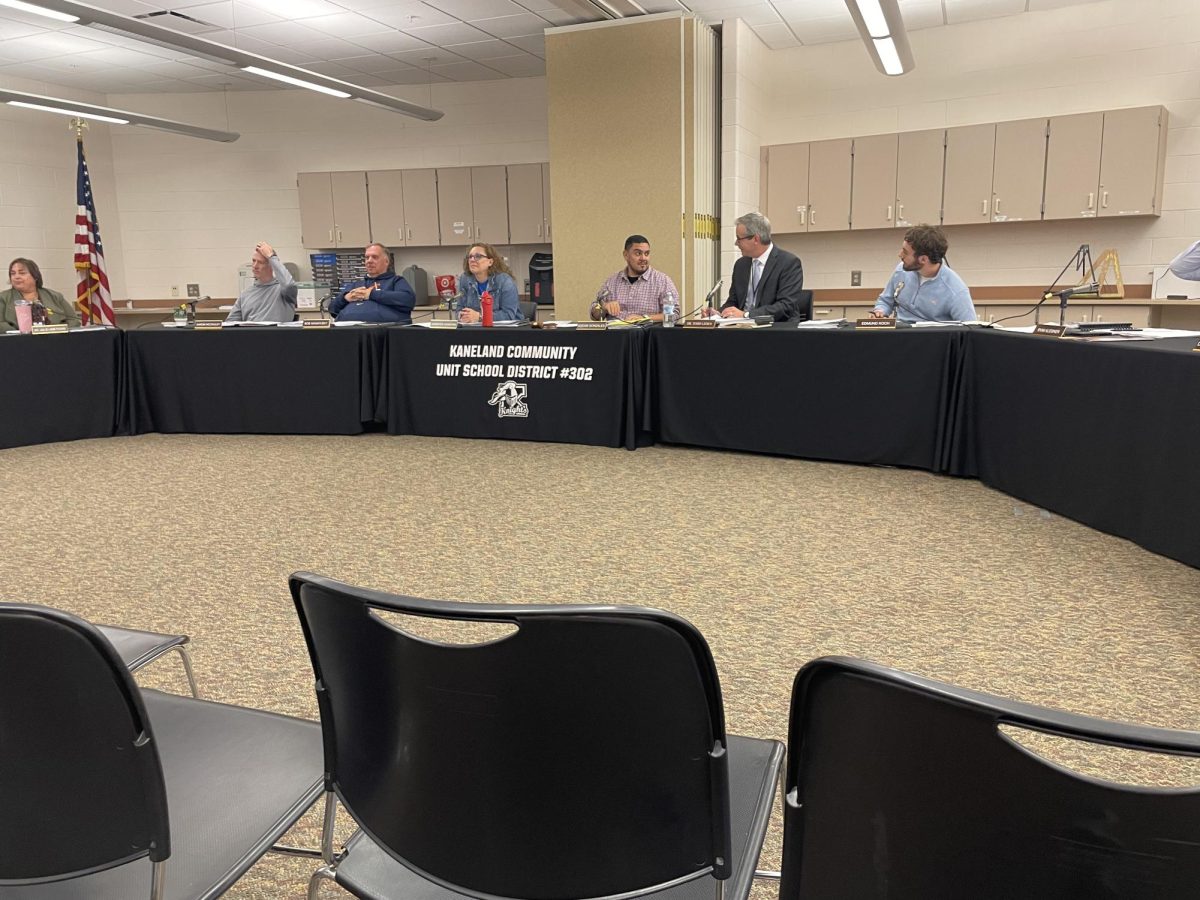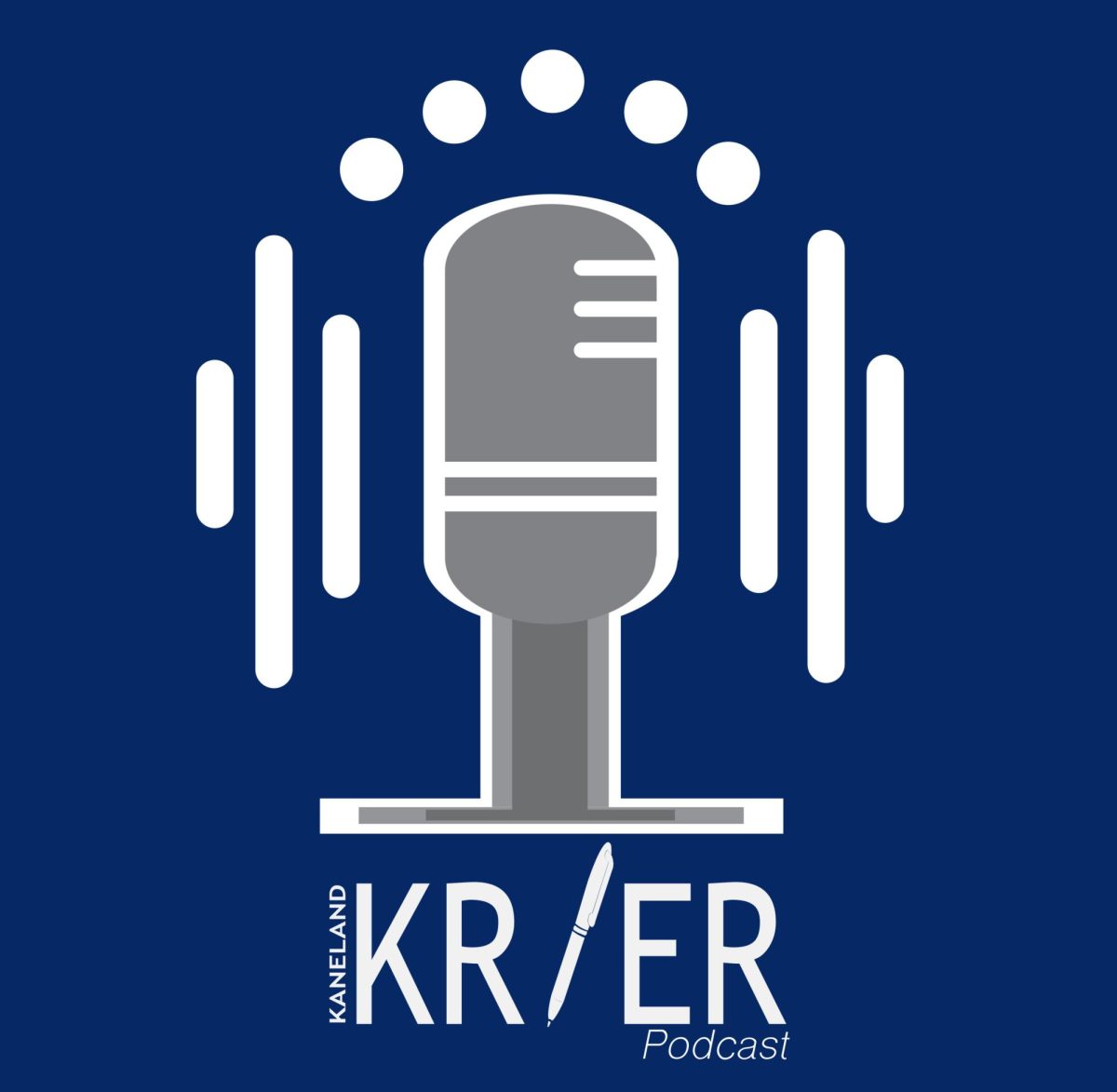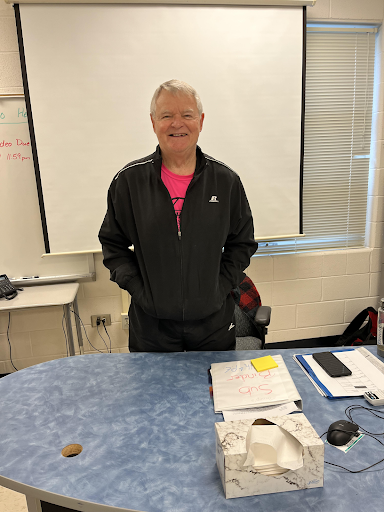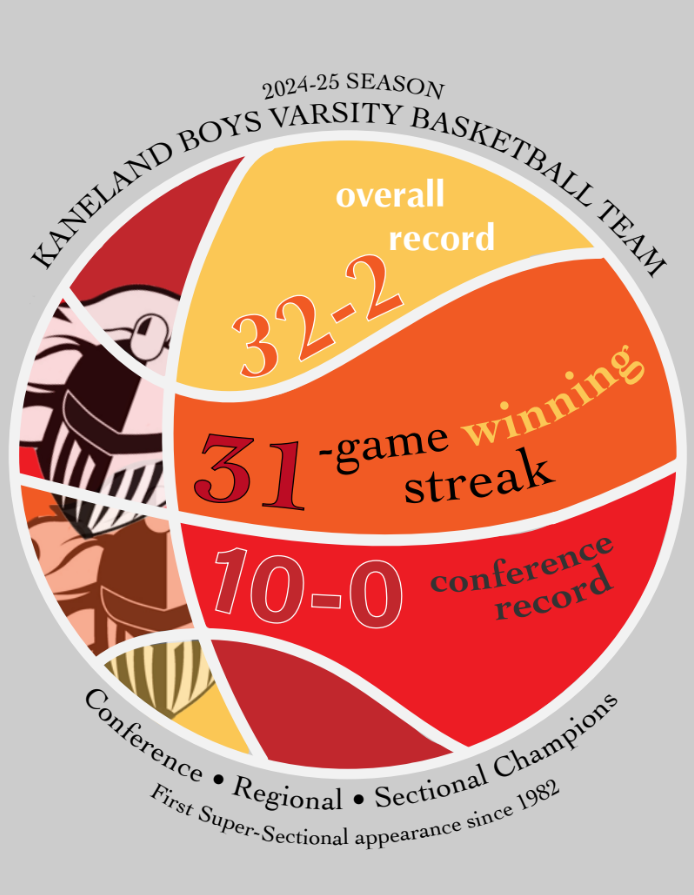On Wednesday, Oct. 11, Kaneland Community Unit School District #302 hosted its regularly scheduled board meeting at 7 p.m. in the sixth-grade team room at Kaneland Harter Middle School. All board members were present at the meeting. Following the Pledge of Allegiance and approval of the agenda, District Superintendent of Schools Dr. Todd Leden confirmed his retirement.
Leden has worked in the field of education for 25 years and has worked for the Kaneland district for nine years. He announced that he will retire on June 3, 2025, and the search for the next superintendent launched on Oct. 12.
“I’m appreciative of the time and appreciative of working with our board and look forward to assisting with the board any way we can as the board makes this transitional shift and eventual replacement,” Leden said.
The board has decided to quickly take on the task so that they can make the best decision for the community when it comes to the replacement of Leden.
“It’s going to be a lot of work, but it’s something we’ve all put the time and effort into,” Board President Addam Gonzales said. “[We’re] committed to [finding a replacement], and we are definitely going to ask for community input in this at all levels because it’s an important decision and maybe one of the most important decisions for the legacy of this board.”
According to the superintendent search timeline, interviews will begin on Nov. 6. Following the announcement and plan for the superintendent search, all principals from the district came together to share their School Improvement Plan (SIP) goals for the year.
Each proposal went fluidly where all elementary schools agreed on working towards reading and writing goals for their students. Harter Middle School will focus on learner profiles, and the Fox Valley Career Center will focus on getting students involved with internships and possible employment regarding their interests.
However, the plan that caused the most questions was Kaneland High School Principal Dr. James Horne’s.
The high school’s SIP goal focuses on Multi-Tiered System of Supports (MTSS) and how that pertains to freshmen on track for graduation. Freshmen on track is used in the research community as a predictor of student success. The main idea is that if a student is on a path towards success as a freshman, they will graduate from high school. It is also used in Illinois as part of the overall rating to evaluate the effectiveness of high schools.
“The goal is for each student in the spirit of individual and personalized education to have different pathways for those students to be successful,” Horne said.
Students who are not successful in completing all the necessary credits at the end of their freshman year get the opportunity to retake those classes the next year. However, when that happens to a student, that is an introductory elective that they can no longer take. The fewer introductory electives students take, the fewer capstone electives they can take during their senior year.
After explaining the lasting effects of how an unsuccessful freshman year can be improved by the SIP goal, Horne explained the decline of students on track for graduation.
In 2019, the percentage of students on track was 94%, but the last reported year showed a percentage of just under 86%. However, as the freshman indicator of success is declining, Horne pointed out that the state’s average graduation rate has remained flat.
“What’s a little bit more concerning is that Kaneland, over the course of four years, has had an 8% point decline, almost 9% point decline, in our freshmen that are on track compared to the state. Even through COVID, theirs has remained flat,” Horne said.
Horne said that the goal is to stop the decline the freshmen are facing while still having a positive impact on the students so they can remain on track for graduation.
After Horne discussed the decline, the board saw it as concerning. Board member Ryan Kleisner asked if the district would investigate the cause for the 8.7% decline.
According to Horne, one of the reasons was the struggle Kaneland faced with the COVID-19 pandemic, but the percentage of students on track for graduation does not reflect Kaneland’s graduation rates. Despite having a decline in freshmen on track, the high school has a 94% graduation rate, which is higher than the state’s average of 87%. The high school has reassessment policies and MTSS, which allow students to complete work and get the help needed to graduate.
However, despite everything Horne stated, it was still seen that the 8.7% decline was a big concern. Gonzales and Kleisner weren’t the only ones with questions when Board Vice President Bob Mankivsky and fellow board members Jennifer Simmons and Dr. Aaron Lawler also voiced their concerns. The board members began voicing their thoughts on if the district did something wrong during the pandemic that may have resulted in such a decline.
District Director of Educational Services 6-12 Patrick Raleigh stepped into the conversation regarding reasons for the decline.
“When we are not necessarily directly COVID related around that time, we did see a huge increase in the number of students that were refusing to come to school, that were coming to school with issues of truancy,” Raleigh said. “We saw a huge increase in the number of students qualifying for 504 plans [and] that were externally hospitalized. They were missing a significant portion of time over the course of those last three years, so all of those contribute to that declined factor.”
The board continued to ask questions but put them to rest when the freshmen on track plan was approved.
Later in the board meeting, standards-based grading (SBG) was also discussed. Raleigh led the topic and shared it with the board.
The new grading system was implemented at the middle and high schools in 2021-22 with almost 30 courses. About 90% of the high school courses are using SBG in the 2023-24 school year, while 100% of the middle school aligns with SBG.
The impact of SBG was discussed regarding the middle school and the high school. In the 2022-23 school year, sixth and seventh-grade students were above both the state and national averages on the standardized i-Ready assessments. For the i-Ready Reading scores, all middle school grades were above the national and state averages. For i-Ready math scores, sixth and seventh-grade were above both the national and state average, while the eighth-grade class was below the national and state average.
After all data collected regarding SAT and PSAT scores, Advanced Placement (AP) Exam scores and grade point averages, it was shown to be all positive as scores are rising.
Raleigh shared the responses from the SBG student and parent survey that was shared with the district in the early fall of this school year.
High school and middle school students took the survey. The results showed that many students do not believe SBG improved their learning. 69% of respondents don’t believe it provides more useful information compared to traditional grading, and 68% of respondents don’t believe it improves their classroom learning experiences.
The thing that students seemed to like the most about SBG was the reassessment policy. By knowing what they need to improve in, students have reported feeling less stressed based on the feedback and reassessment policy. However, students also shared some of the negatives by bringing attention to how each department varies in how they apply SBG. There is a need for perfection in certain courses to get an A, and calculating grades can be confusing.
Parent survey results were relatively similar. 46% of the respondents understand how SBG works and what it is. Yet nearly 80% of respondents worry the standards-based grading will hurt college admissions, and 66% of respondents do not agree that feedback on learning is provided to both students and parents.
Parents highlighted the positives of SBG by acknowledging the benefits of the reassessment policy, including clarity in identifying areas of improvement and being able to comprehend information before assessing better than before. Some of the negatives were how SBG doesn’t allow students to be prepared for college or careers, as well as limiting motivation to study and do homework.
After all the results were shared, the board discussed the negatives and positives and agreed that SBG still needs some fixing, but it ended up showing promising results in terms of the data collected regarding scores from AP Exams, PSAT and SAT scores and overall student grades.
The next board meeting will be held on Monday, Oct. 30.










